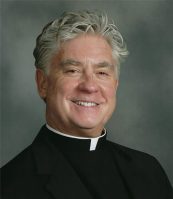Sometimes changes occur from the top down, sometimes from the bottom up, and sometimes from an outside force like the coronavirus of 2020. I suppose some practices of the Catholic Mass will be different in the future. The Sign of Peace, receiving communion-bread on one’s tongue, or drinking from a shared chalice may be gone forever. We may never again see holy water bowls into which hundreds of people dip their hands and fingers before crossing themselves. For those in vulnerable age or health categories, the obligation to attend Mass in-person might be lifted forever. This is pure speculation on my part but I think we can anticipate some different customs and expectations as we move beyond our current limitations.
When changes occur, we differentiate fads that quickly pass from best practices that remain. In the church we distinguish between sacraments (like baptism) and sacramentals (like holy water). The former is a big “T” tradition of crucial importance while the latter is a small “t” tradition or sign by which we routinely ritualize the fontal message. We inherited the primacy of the Sabbath from our Jewish ancestors who exalted the third commandment by implementing a day of worship, rest, and rejuvenation so that we can focus upon our chief relationship in life, that between God’s divinity and our humanity. As many Catholics who exist in fear of mortal sins remind me, the church essentially says, “Go to Mass on Sunday or you will go to hell.” That, of course, is not the command of God; it is a precept of the church. “Keep holy the Sabbath” is a big “T” tradition and sacrament, a staple of life for God’s people; “Go to Mass on Sunday” is a church regulation, a routine sign from us that honors God’s directive. But keeping the Sabbath holy involves far more than perfunctory attendance at a place of worship. It involves giving primacy to our relationship with God, while putting work and other things that demand our time, attention, energy, and efforts in their proper secondary places.
There are seven days in every week. That the Lord stipulates one to be given solely to Him should not be viewed as unusual—after all, we are creatures of the Creator and every breath we take is due to the life He gave us. There are 168 hours in every week. I don’t think it is unreasonable for the church for ask us to give just one to praise and thank Him in communal worship alongside a host of others who’re much like us. We are all sinners desiring to become saints. To stand shoulder to shoulder with them, week after week, in gratitude seems minimalistic. It is even easier during this pandemic. I am delighted to hear stories from some families about attending Mass in their living room on Sunday morning: how they draw closer because of it and have more meaningful conversations about scripture passages, homilies, and other messages. They also report being more relaxed and restful in their domestic setting, which is another part of the commandment, from which we have drifted away. Keeping the Sabbath holy inculcates getting properly aligned with God, straightening out our priorities, and putting all of our busy activities—sports, social events, school, work—in their secondary places.
I don’t know what our Sunday worship will look like a year from now but I am pretty sure that some of our rubrics and rituals will be altered. Perhaps we will even find ways to build upon those good interactions that some families are experiencing in virtual Masses at home. Their sharing of spiritual thoughts and discussions of how God might be working in them and our world at this time are key aspects of a holy Sabbath. I think this is a proper time for us to gain greater understanding of the Lord’s command to Keep holy the Sabbath and the church’s precept to Go to Mass. It is also an appropriate time to differentiate what is more important (Sacraments more than sacramentals, Traditions with a big “T” more than those little traditions that come and go, Commandments more than precepts, the Word of God more than the words of institutional officials, the whole Sabbath more than the single act of attending Mass).

Thank you so much for the wonderful message!
Nannette Wolford
Amy Coffer’s mom
Sent from my iPhone
LikeLike